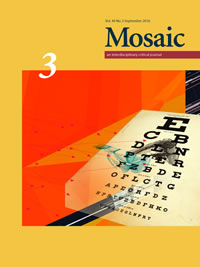Issue 49.3
Overview

General Issue
Published: September 2016
View the issue introduction or see the issue summary and contents below.
10 essays, totalling 192 pages
$21.95 CAD
This issue of Mosaic includes ten essays that engage a diverse range of works by John Dos Passos, Lawrence Durrell, Jean-Luc Godard, Flannery O’Connor, Michael Ondaatje, Aimee Phan, and Olivia Rosenthal, among others. From non-linear storytelling techniques to animal narratives and the persistence of the robot figure in popular culture, this issue covers a broad range of literary and cultural texts.
How and What to Recollect: Political and Curative Storytelling in Silko’s CeremonyJin Man Jeong This essay examines the politically disruptive voices in Leslie Marmon Silko’s Ceremony, arguing that her storytelling, which centres on “deferred action” as illustrated through the Freudian/Benjaminian notion of the return of the repressed, both undercuts the Euro-American notion of linear time involved with colonialist discourses and envisions healing by recollecting boundarylessness. | |
Robby the Robot and Robotic PersistenceJay Telotte This essay takes a “memetic” approach to a persistent figure of science fiction media, Robby the Robot of Forbidden Planet. The figure’s persistence in the cultural imaginary reflects our conflicted attitude toward efforts at linking the technological body with an electronic mind, beginning in the post-war era and continuing today. | |
Third Culture Time and Place: Michael Ondaatje’s The Cat’s TableAntje M. Rauwerda The dislocation of characters causes narrative discontinuity in Michael Ondaatje’s The Cat’s Table. For third culture characters who move through a series of international locations without a specific attachment or commitment to any one, identity is defined by geographical eras and narrative is structured according to geography rather than chronology. | |
‘Un tissu de mots’: Writing Human and Animal Life in Olivia Rosenthal’s Que font les rennes après Noël ?Joseph Mai In Que font les rennes après Noël ? Olivia Rosenthal splices an intimate autobiographical narrative together with various, at first seemingly unrelated, texts about animals. This essay explores ways in which her formal experiment unsettles conventional (anthropocentric and patriarchal) discourses and practices that have traditionally shaped the border between humans and animals. It considers some of the ethical and aesthetic implications of this commitment to writing. | |
The Ancient Egyptian Context of The Alexandria QuartetBruce Redwine This essay discusses Lawrence Durrell’s themes and characterizations as they pertain to ancient Egyptian iconography and traditions in The Alexandria Quartet. | |
Eleanor Catton’s The Rehearsal: Theatrical Fantasy and the GazeGraham Wolfe This essay draws on Slavoj Žižek and Jacques Lacan to explore the dynamics of fantasy, desire, and enjoyment in Eleanor Catton’s The Rehearsal, emphasizing the novel’s irreducibility to a postmodernist funhouse. | |
The Vietnamese American ‘Model Orphan’ in Aimee Phan’s We Should Never MeetEmily Cheng This essay examines Aimee Phan’s fiction concerning Vietnamese orphans and adoptees coming of age in Southern California. Engaging the transnational dimensions of U.S. ideologies of democracy, family, and race, this essay explores a “model orphan” construct that expands mainstream narratives of the Vietnamese American refugee and model minority. | |
The Morgan Loans, Baku Oil, and Woodrow Wilson: How Valid Were John Dos Passos’s Claims in 1919?Milton Cohen This essay examines the validity of three political claims in John Dos Passos’s novel, 1919: that the Morgan loans forced the United States into World War I; that “oil was trumps” at the Peace Conference; and that President Wilson was “trimmed” by Georges Clemenceau and David Lloyd George, destroying his liberal peace objectives. | |
What Counts: Social Drama and Connectedness in Flannery O’Connor’s ‘The River’ and ‘Revelation’Irene Visser This essay explores Flannery O’Connor’s “The River” and “Revelation” from an interdisciplinary perspective. Concepts from the social sciences such as social dramas, ritual performance, and symbolic actions illuminate main moments of conflict and reconciliation between characters and their social milieu and aid understanding of the reading experience offered in O’Connor’s stories. | |
Bakhtinian Polyphony in Godard’s King LearKeith Harrison Mikhail Bakhtin’s socio-linguistic theories can illuminate the orchestration of Jean-Luc Godard’s contentious film King Lear. Shaping the polyphonic voices of Brecht, Kott, Beckett, Mailer, Welles, Allen, Kozintsev, and Woolf through counterpoint, the auteur refracts an elusive self-portrait and dialogically re-accentuates Shakespeare’s tragedy. |